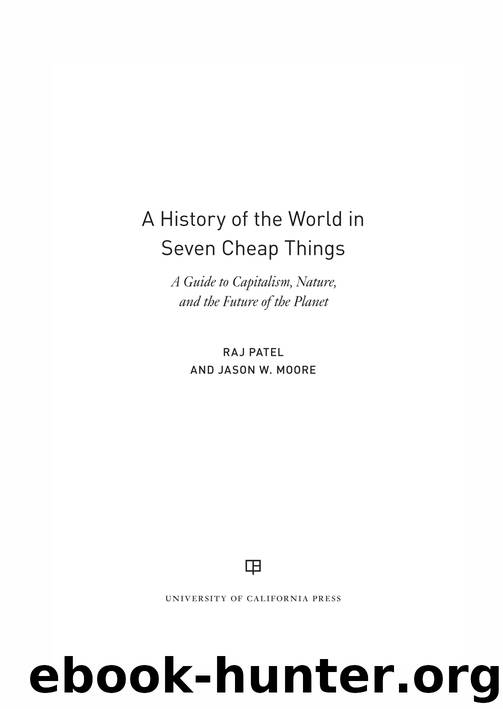A History of the World in Seven Cheap Things: A Guide to Capitalism, Nature, and the Future of the Planet by Raj Patel & Jason W. Moore

Author:Raj Patel & Jason W. Moore [Patel, Raj & Moore, Jason W.]
Language: eng
Format: epub
Tags: History, World, Social Science, Anthropology, Cultural & Social, Sociology, General
ISBN: 9780520966376
Google: NjEyDwAAQBAJ
Amazon: B075GHG2KZ
Publisher: Univ of California Press
Published: 2017-09-19T00:00:00+00:00
THE DUTCH DISEASE
Let’s begin with the words of Peter Voser, who in 2012 was the CEO of Royal Dutch Shell:
In the United States, for example, the American Petroleum Institute estimates that the industry supports more than nine million jobs directly and indirectly, which is over 5% of the country’s total employment. In 2009 the energy industry supported a total value added to the national economy of more than US$ 1 trillion, representing 7.7% of US GDP.
Beyond its direct contributions to the economy, energy is also deeply linked to other sectors in ways that are not immediately obvious. For example, each calorie of food we consume requires an average input of five calories of fossil fuel, and for high-end products like beef this rises to an average of 80 calories. The energy sector is also the biggest industrial user of fresh water, accounting for 40% of all freshwater withdrawals in the United States. . . .
Powerful actors need to make the role of the energy sector and the benefits of our work clear, while demonstrating that we can be trusted to work together across boundaries to face the challenges ahead. In return, society at large will grant a license to operate that is too often missing today.19
It was part of Voser’s job to engineer the triumph of the fossil fuel industry, over the protests of those such as the Ogoni Ken Saro-Wiwa, who was put to death in 1995, his life rendered cheap by Royal Dutch and Nigeria because he organized against them.20 As the official history of the company—which was founded to develop oil fields in what is now Indonesia—puts it, “The rise of the Royal Dutch was rendered possible only by the victory in the field of colonial policy of those liberal principles according to which the interests of Asiatic Dominions are best served by the free competition of Western capital and Western labour in the development of the resources of these tropical regions.”21 As the boom, deforestation, and bust of Madeira over seventy years show, capitalism’s insatiability for fuel is part of its ecology. Royal Dutch is just the latest player in a long history of cheap energy.
This company was made possible by revenues, and finance, based on a fuel crisis in the fifteenth-century Netherlands, several centuries before its founding. Dutch soil was once filled with black gold: not oil but peat, an energy source still used today for heating and even for generating electricity.22 It’s the youngest of the fossil fuels and offers about two-thirds the energy of coal by weight.23 Peat is coal’s precursor. After enough time and pressure, the former becomes the latter, and peat—and thus coal—was once wetland vegetation. As this vegetation decayed in northern and central Europe, it formed pillow-shaped layers more than a mile (1.6 kilometers) in diameter, which accumulated into raised bogs. By the early Middle Ages, these reached around fifteen feet (4.6 meters) above sea level. Beginning in the eleventh century, however, peasants gathered peat for heating, salt processing, and sale.
Download
This site does not store any files on its server. We only index and link to content provided by other sites. Please contact the content providers to delete copyright contents if any and email us, we'll remove relevant links or contents immediately.
Cecilia; Or, Memoirs of an Heiress — Volume 1 by Fanny Burney(32559)
The Great Music City by Andrea Baker(32020)
Cecilia; Or, Memoirs of an Heiress — Volume 2 by Fanny Burney(31957)
Cecilia; Or, Memoirs of an Heiress — Volume 3 by Fanny Burney(31943)
We're Going to Need More Wine by Gabrielle Union(19049)
All the Missing Girls by Megan Miranda(16033)
Pimp by Iceberg Slim(14513)
For the Love of Europe by Rick Steves(14136)
Bombshells: Glamour Girls of a Lifetime by Sullivan Steve(14077)
Talking to Strangers by Malcolm Gladwell(13374)
Norse Mythology by Gaiman Neil(13371)
Fifty Shades Freed by E L James(13244)
Mindhunter: Inside the FBI's Elite Serial Crime Unit by John E. Douglas & Mark Olshaker(9345)
Crazy Rich Asians by Kevin Kwan(9293)
The Lost Art of Listening by Michael P. Nichols(7507)
Enlightenment Now: The Case for Reason, Science, Humanism, and Progress by Steven Pinker(7315)
The Four Agreements by Don Miguel Ruiz(6766)
Bad Blood by John Carreyrou(6623)
Weapons of Math Destruction by Cathy O'Neil(6282)
